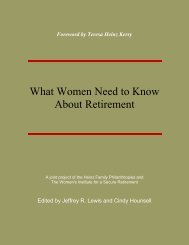What Women Need to Know About Retirement - Wiser
What Women Need to Know About Retirement - Wiser
What Women Need to Know About Retirement - Wiser
Create successful ePaper yourself
Turn your PDF publications into a flip-book with our unique Google optimized e-Paper software.
Note: It may be that you are ineligible for Medicaid at first, but several states allow people <strong>to</strong><br />
enter a facility and then spend down their income and assets on nursing home bills <strong>to</strong> become<br />
eligible. However, there are many rules and regulations for “spending down.” You might want<br />
<strong>to</strong> consult an at<strong>to</strong>rney or financial planner. In any case, be sure you understand the rules in your<br />
state.<br />
Be assured, if you are married and only one of you needs nursing home care, the one not in the<br />
nursing home will not be required <strong>to</strong> become destitute in order <strong>to</strong> pay for the care of the other. In<br />
other words, you would not be required <strong>to</strong> “spend down” by selling your home <strong>to</strong> pay for your<br />
husband’s care. On the other hand, Medicaid can require some "payback" by billing his estate<br />
after he has died.<br />
<strong>What</strong> does Medicaid cost? Depending on your state's rules, you may be asked <strong>to</strong> pay a<br />
small co-payment for some medical services. Medicaid makes payments directly <strong>to</strong> your<br />
health care provider—it does not pay the money <strong>to</strong> you. If you think you might qualify<br />
or for more information, go <strong>to</strong>: www.cms.hhs.gov/Medicaid.<br />
Medicare Supplemental Insurance (Medigap Insurance)<br />
If you are in the Original Medicare Plan (Parts A and B), there are gaps in Medicare’s<br />
coverage of the care and services you might need. Medigap insurance was designed <strong>to</strong><br />
fill those gaps.<br />
<strong>What</strong> is it? Medigap insurance helps <strong>to</strong> pay for what Medicare does not cover—things<br />
such as such as deductibles and coinsurance. Medigap policies are sold by private<br />
insurance companies. <strong>What</strong> plan you buy should depend on both what types of care you<br />
need and what you can afford. Note: Generally, when you buy a Medigap policy, you<br />
must have Medicare Part A and Part B. If you are in a Medicare Advantage Plan or other<br />
Medicare Health Plan, you may not need a Medigap policy. Be sure <strong>to</strong> review your plan<br />
coverage <strong>to</strong> see what is and is not covered.<br />
<strong>What</strong> does it cover? Insurance companies can only offer “standardized” policies that<br />
follow state and federal rules. Currently, 12 different Medigap plans labeled “A” through<br />
“L” are available. Plan A covers only the basic (core) benefits. These basic benefits are<br />
included in all the Medicare plans (A through L). Medigap Plans B through J offer extra<br />
benefits or combinations of benefits. Plans K and L have benefits similar <strong>to</strong> plans A<br />
through J, but they offer lower monthly premiums and higher out-of-pocket costs. Are<br />
there specific kinds of care you need and use? Check <strong>to</strong> see if that service is covered in<br />
the plan you purchase. Note: Medigap insurance does not cover long-term care services.<br />
<strong>What</strong> does it cost? Medigap policy premiums vary depending on the provider and the<br />
level of benefits provided. Before you purchase a policy, compare premiums—there can<br />
be a big difference in price from company <strong>to</strong> company for the same policy. Note: If you<br />
are married, you and your spouse must purchase separate Medigap policies. Your policy<br />
will not cover the health expenses of your spouse.<br />
Long-Term Care Insurance<br />
A woman age 65 <strong>to</strong>day can expect <strong>to</strong> live another 19 years. That’s the good news. The<br />
bad news is the estimate that over 50 percent of women will enter a nursing home before<br />
44




